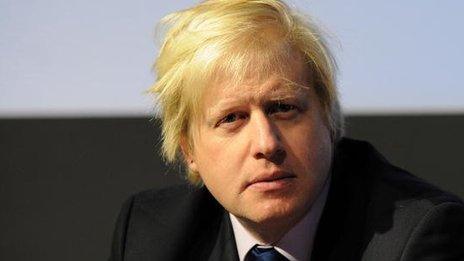Nick Clegg accuses Boris Johnson of 'careless elitism'
- Published
Clegg reaction to Boris speech
Nick Clegg has accused London Mayor Boris Johnson of "careless elitism" for suggesting that some people are not clever enough to succeed in life.
Mr Johnson said in a speech that 16% "of our species" have an IQ below 85, and called for more to be done to help the brightest people in the country.
But Mr Clegg said it was "fairly unpleasant" to talk about people "as if we are a breed of dogs".
The Lib Dem leader said people should be encouraged and not told to give up.
Speaking on his weekly LBC radio phone-in he said that the danger of such a "deterministic" view of people based on their IQ was "complete anathema to everything I have stood for in politics".
'Dispiriting'
Mr Johnson made his comments, external as he delivered the Centre for Policy Studies' annual Margaret Thatcher lecture.
He defended the importance of "boardroom greed" and "some measure of inequality" as a spur to economic activity at a time when the income gap between those at the top and those at the bottom was getting ever wider.

Boris Johnson was making a speech honouring the late PM Margaret Thatcher
He said that any discussion about equality had to take account of the fact that people had different IQ levels, adding: "The harder you shake the pack, the easier it will be for some cornflakes to get to the top."
"I am afraid that violent economic centrifuge is operating on human beings who are already very far from equal in raw ability, if not spiritual worth," Mr Johnson said.
Commenting on the mayor's speech, Mr Clegg said: "Much though he is a funny and engaging guy, I think these comments reveal a fairly unpleasant, careless elitism that suggests we should somehow give up on a whole swathe of our fellow citizens."
He said politicians should be "instilling an opportunity culture" rather than sending out such a "dispiriting" message.
"Our job in politics is surely not to simply say we are going to hive off one bunch of people and put them in one category and kind of basically say they are parked and that there is not much we can do about them."
Academic selection
Mr Johnson's speech has been widely reported as an attempt to shore up his position with the Conservative right and stake his claim as Lady Thatcher's political heir.
He argued that a new generation of "Gordon Gekkos" - a reference to the character in the film Wall Street whose mantra was "greed is good" - should do more to help the wider population but that their greed was a "valid motivator".
"For one reason or another - boardroom greed or, as I am assured, the natural and God-given talent of boardroom inhabitants - the income gap between the top cornflakes and the bottom cornflakes is getting wider than ever," he said.
"I stress, I don't believe that economic equality is possible; indeed, some measure of inequality is essential for the spirit of envy and keeping up with the Joneses that is, like greed, a valuable spur to economic activity."
Prime Minister David Cameron's official spokesman said: "I don't know whether he has read Boris's speech but what I do know is the PM's view about the importance of equality of opportunity.
"When it comes to the PM's views around the importance of an entrepreneurial economy he gave a speech on the subject recently at the Mansion House," he added.
In his speech, the London mayor advocated a new generation of grammar schools, describing academic competition between children as a "most powerful utensil of academic improvement".
While acknowledging the former PM had closed many such schools, he suggested she would have found a way to bring them back under a different guise "to help bright children everywhere to overcome their background".
Mr Johnson also criticised the BBC's coverage of the late prime minister's funeral, accusing the corporation of trying to "foment an uprising" which never materialised.